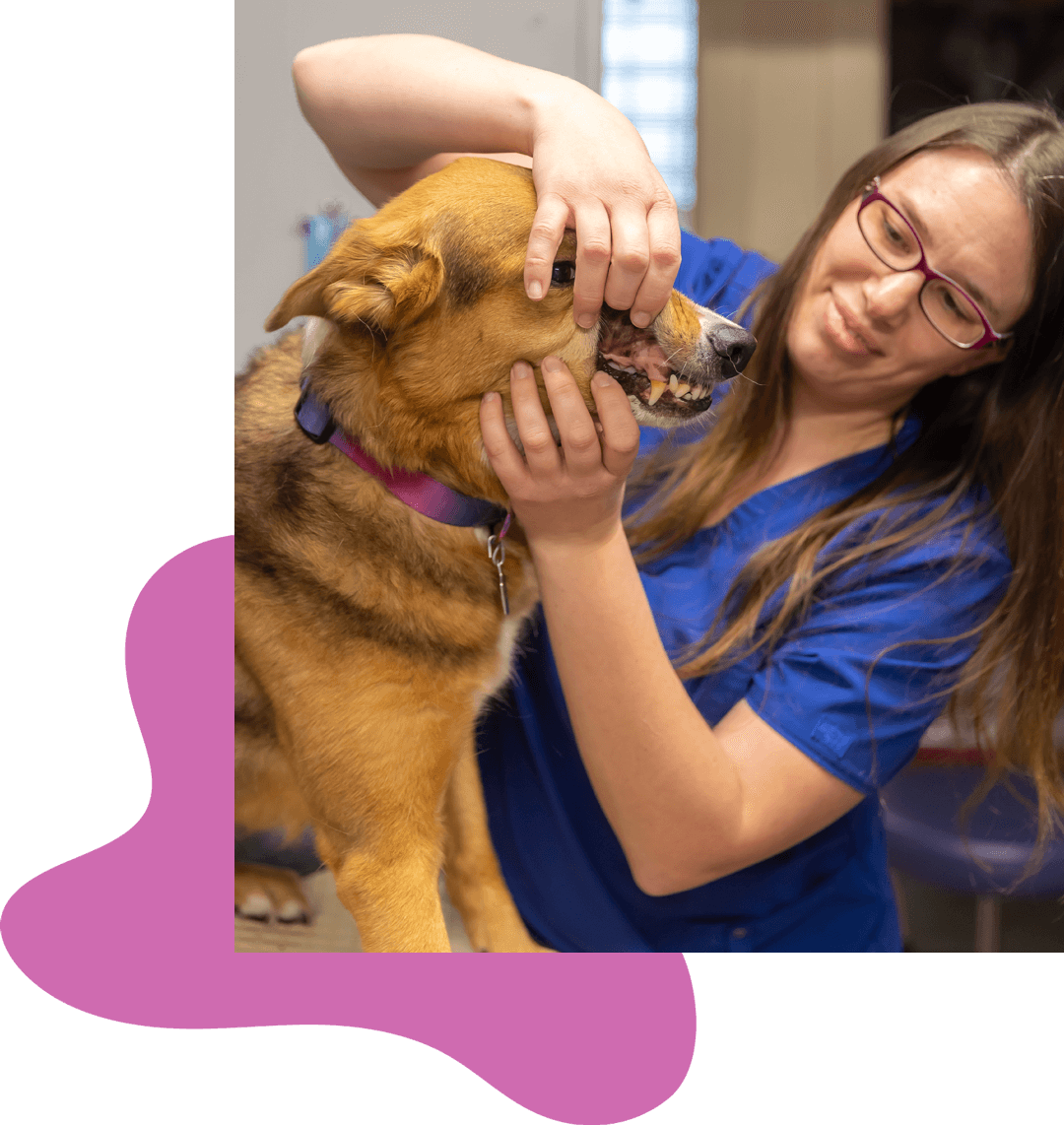Dog and Cat Teeth Cleaning in La Crosse
Dental health is often an indicator of your pet’s overall health, so it’s important to have a veterinarian examine your pet’s teeth at least once a year! Dogs and cats need regular teeth cleanings to reduce their risk for dental disease, which causes bad breath, painful gums, and the deterioration of tooth roots and gum tissue. Dental disease may also potentially cause heart, liver, and kidney disease if the infection persists. Here at La Crosse Veterinary Clinic, we offer a number of pet dental care services to prevent dental disease and other issues. To learn more about each service, see the information below!
To book an appointment with our veterinarians call (608) 781-3466 or use the online form!

Dog and Cat Teeth Cleaning (Dental Prophylaxis)
Our dog and cat teeth cleaning procedures—also known as dental prophylaxis—involve thoroughly cleaning the teeth and preventing oral infection and disease as well. For every cleaning we perform, we monitor each pet’s vital signs before, during, and after treatment. We also use warming pads and fluids for added comfort throughout the entire procedure.
Our dental prophylaxes involve a three-phase process, detailed below. You can also print our Explanation of an Itemized Dental Treatment Plan and Dentistry at La Crosse Veterinary Clinic handouts if you need more information!
Prior to beginning dental treatment, we perform pre-anesthetic blood work to ensure that your pet is healthy before being anesthetized. Then we place an IV catheter, which is used for short-acting induction anesthesia, pain relief medications, fluids, and any additional medications needed during the procedure. Lastly, we place a breathing tube to begin anesthesia administration.
The dog or cat teeth cleaning procedure includes the following seven steps:
- We begin by examining the entire mouth, noting any signs that may indicate an infection.
- Next, we examine the mouth tissue above and below the gum line to look for irregularities.
- To view structures below the gum line and determine if there are any hidden abnormalities, we take digital dental X-rays of the mouth.
- We clean the teeth using an ultrasonic scaler, which removes tartar deposits and smooths the area under the gum line.
- After cleaning the teeth, we polish them to correct any minor surface imperfections.
- Next, we use an antiseptic rinse to remove any remaining debris from the mouth and to freshen your pet’s breath.
- We then use a fluoride application on the teeth to seal and protect the enamel.
After your pet’s dental treatment is complete, we remove him or her from anesthesia and continue to monitor them until they are fully awake and then for several hours after that. At that time, we will contact you to notify you of your pet’s status. When we discharge your pet, we will give you before and after pictures, along with instructions and recommendations for at-home dental care. If necessary, we will also provide medication such as antibiotics or additional pain relief.
Cat Dental Health
Below, you will find information on a specific oral condition in cats and cat dental grades, each of which details the severity of the symptoms and the need for professional cat teeth cleaning.
Feline Oral Resorption
Feline oral resorption is one of the most common oral problems seen in cats. It begins as small lesions in the tooth enamel, similar to a cavity on the side of the tooth, but can eventually affect the nerves and blood vessels, causing severe pain. A cat with oral resorptive lesions may also exhibit signs such as drooling, difficulty chewing, and lack of appetite. Currently, the only way to treat a tooth with lesions is to remove it. View our Feline Oral Resorption handout to learn more.

Feline Dental Grades
![]() Grade 1
Grade 1
Grade 1
Minor: At this stage, early gingivitis has taken effect. Soft plaque and tartar have accumulated on the surface of the teeth, and the gums are red and inflamed.
Recommended professional dental treatment: Within six months of this stage
![]() Grade 2
Grade 2
Grade 2
Moderate: Gingivitis has progressed into moderate tartar and plaque buildup, causing pockets to form between the gums and teeth where food, bacteria, and other particles can accumulate. The gums are red, swollen, and painful to the touch and may even bleed. Treatment is needed to reverse the progression of disease.
Recommended professional dental cleaning treatment: Within three months
![]() Grade 3
Grade 3
Grade 3
Major: Gingivitis has progressed and includes heavy tartar, plaque, and calculus buildup as well as permanent tooth damage. Pockets between the teeth and gum line are larger, causing even more bacteria and debris to accumulate. At this stage, infection has taken place and destroyed gum tissue, causing some teeth to loosen. As a result, the gums are very tender, painful, bright, and may bleed easily.
Recommended professional dental cleaning treatment: Within two to four weeks
![]() Grade 4
Grade 4
Grade 4
Severe: Gum disease is present and includes severe tartar, plaque, calculus deposits, root infection, and usually severe pain. Permanent damage has occurred, including extensive tissue damage as a result of toxic debris and inflammation. Bone loss has also occurred, causing many teeth to become loose and bacteria to enter the blood stream.
Recommend professional dental cleaning treatment: Immediately!
Grade 1
Minor: At this stage, early gingivitis has taken effect. Soft plaque and tartar have accumulated on the surface of the teeth, and the gums are red and inflamed.
Recommended professional dental treatment: Within six months of this stage
Grade 2
Moderate: Gingivitis has progressed into moderate tartar and plaque buildup, causing pockets to form between the gums and teeth where food, bacteria, and other particles can accumulate. The gums are red, swollen, and painful to the touch and may even bleed. Treatment is needed to reverse the progression of disease.
Recommended professional dental cleaning treatment: Within three months
Grade 3
Major: Gingivitis has progressed and includes heavy tartar, plaque, and calculus buildup as well as permanent tooth damage. Pockets between the teeth and gum line are larger, causing even more bacteria and debris to accumulate. At this stage, infection has taken place and destroyed gum tissue, causing some teeth to loosen. As a result, the gums are very tender, painful, bright, and may bleed easily.
Recommended professional dental cleaning treatment: Within two to four weeks
Grade 4
Severe: Gum disease is present and includes severe tartar, plaque, calculus deposits, root infection, and usually severe pain. Permanent damage has occurred, including extensive tissue damage as a result of toxic debris and inflammation. Bone loss has also occurred, causing many teeth to become loose and bacteria to enter the blood stream.
Recommend professional dental cleaning treatment: Immediately!
Dog Dental Health
WARNING: The following images contain graphic content.
Need help determining if your dog needs a dental cleaning? Refer to the dental grade images below. To maintain your dog’s oral health, we recommend bringing them in at least once a year for a nose-to-tail wellness exam, which includes an assessment of the mouth.
![]() Grade 1
Grade 1
Grade 1
Minor: Early gingivitis takes effect at this stage, with soft plaque and tartar forming on tooth surfaces and the gums becoming red and inflamed.
Recommended professional dental treatment: Within six months of this stage
![]() Grade 2
Grade 2
Grade 2
Moderate: Gingivitis progresses into moderate tartar and plaque buildup, creating pockets between the gums and teeth. Food, bacteria, and other particles can accumulate in these pockets. The gums are bright red, swollen, and painful, and they may also bleed. Treatment is essential to reverse this condition.
Recommended professional dental cleaning treatment: Within three months
![]() Grade 3
Grade 3
Grade 3
Major: Gingivitis continues to progress, developing into heavy tartar, plaque, and calculus buildup. This usually leads to permanent tooth damage. The pockets between the teeth and gum line grow larger, which results in the accumulation of even more bacteria and debris. Also at this stage, teeth may begin to loosen as the infection causes further damage to the gum tissue. The gums are therefore very painful, bright red, and possibly bleeding.
Recommended professional dental cleaning treatment: Within two to four weeks
![]() Grade 4
Grade 4
Grade 4
Severe: Gum disease is fully present in the mouth. At this stage, that includes severe tartar and plaque, calculus deposits, root infection, and debilitating pain. There is permanent damage to the teeth and gums, and loss of bone has also occurred, causing further tooth loosening and the entrance of bacteria into the blood stream.
Recommend professional dental cleaning treatment: Immediately!
Grade 1
Minor: Early gingivitis takes effect at this stage, with soft plaque and tartar forming on tooth surfaces and the gums becoming red and inflamed.
Recommended professional dental treatment: Within six months of this stage
Grade 2
Moderate: Gingivitis has progressed into moderate tartar and plaque buildup, causing pockets to form between the gums and teeth where food, bacteria, and other particles can accumulate. The gums are red, swollen, and painful to the touch and may even bleed. Treatment is needed to reverse the progression of disease.
Recommended professional dental cleaning treatment: Within three months
Grade 3
Major: Gingivitis continues to progress, developing into heavy tartar, plaque, and calculus buildup. This usually leads to permanent tooth damage. The pockets between the teeth and gum line grow larger, which results in the accumulation of even more bacteria and debris. Also at this stage, teeth may begin to loosen as the infection causes further damage to the gum tissue. The gums are therefore very painful, bright red, and possibly bleeding.
Recommended professional dental cleaning treatment: Within two to four weeks
Grade 4
Severe: Gum disease is fully present in the mouth. At this stage, that includes severe tartar and plaque, calculus deposits, root infection, and debilitating pain. There is permanent damage to the teeth and gums, and loss of bone has also occurred, causing further tooth loosening and the entrance of bacteria into the blood stream.
Recommend professional dental cleaning treatment: Immediately!
Dental Care Products & Tips for Pets
Managing your dog or cat’s dental care at home is the most important step in preventing dental disease. To keep their mouth healthy between teeth cleanings, La Crosse Veterinary Clinic recommends products that are approved by the Veterinary Oral Health Council. These include a wide selection of dental chews, anti-plaque products, dental sealants, and a number of diet food products. Products are awarded with the VOHC seal if they are proven to effectively help control plaque and tartar.
If you want to start brushing your pet’s teeth but need a little help to get started, use the links below for helpful information! You can also always call our clinic at (608) 781-3466 to speak with our team.
